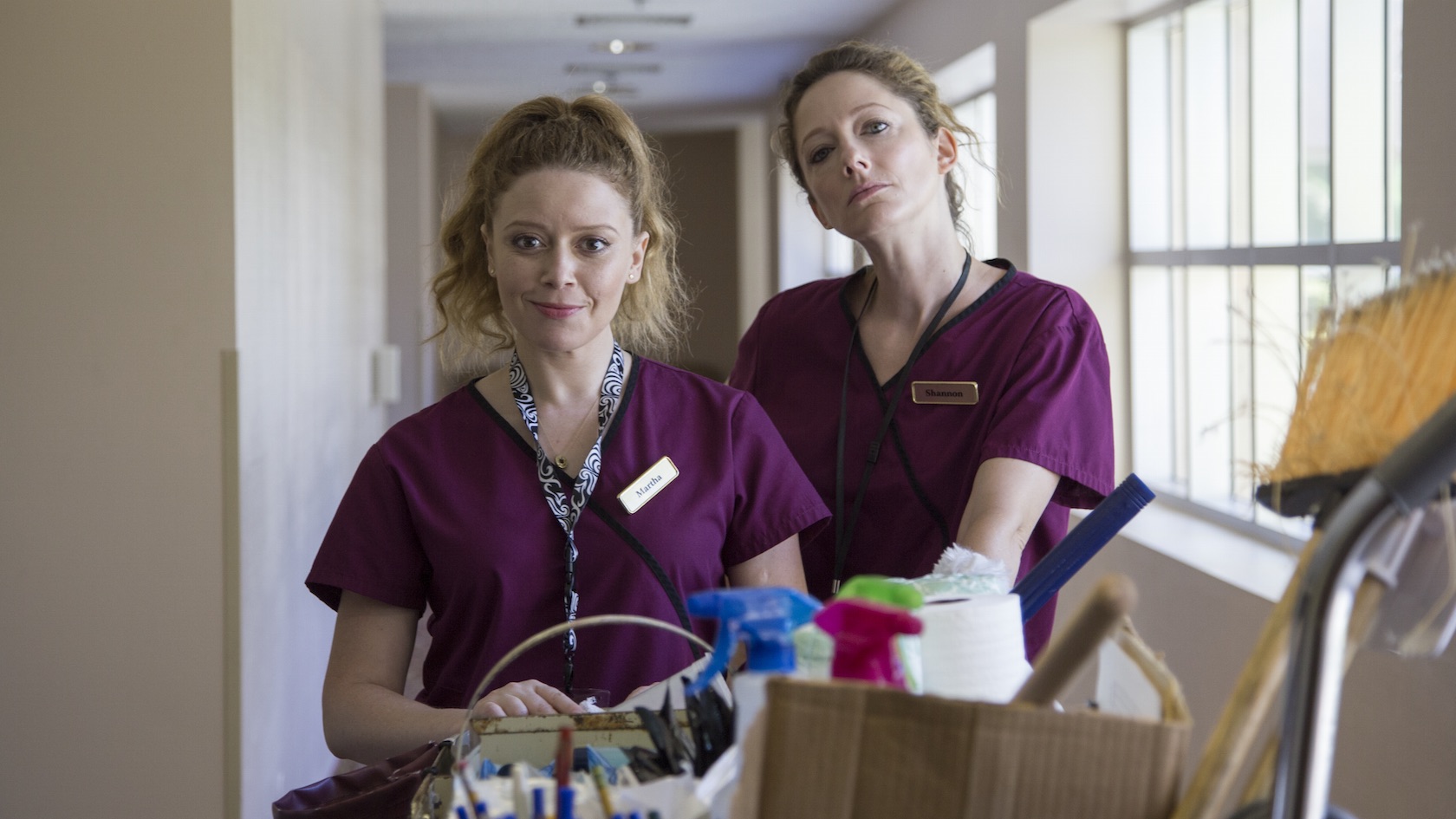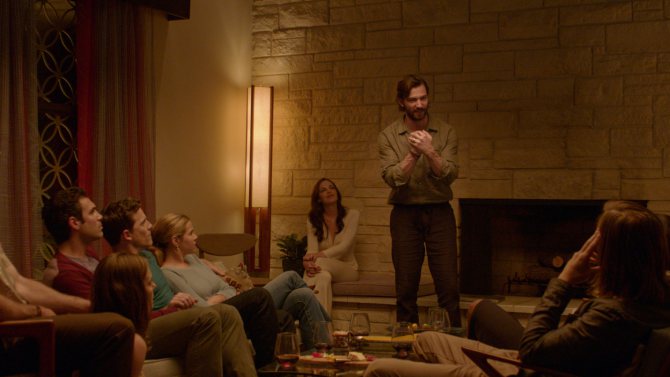The state of female directors in Hollywood is fairly bleak. For an industry that so often prides itself on being groundbreaking and open-minded, the statistics are terrible; speak with female directors working in the business and they’ll acknowledge that sexism is alive and well in the film industry, in front and behind the screen. Change is needed, and companies like Gamechanger are trying to do it from within.
Founded a year and half ago, Gamechanger is a for-profit production company that finances female directed films. In less than 2 years, after receiving 700 film submissions, they’ve produced and sold three films to distributors, and have two more films in different stages of production. Their first film, Land Ho! (sold to Sony Pictures Classics), won the prestigious John Cassavetes Award at the Independent Spirit Awards. Upcoming, they have two films which premiered at the SXSW festival, the thriller The Invitation (distributed by Drafthouse and Netflix) and the comedy Addicted to Fresno (distributed by Gravitas Ventures).
Behind Gamechanger are people like President Mynette Louie, a Harvard graduate who began her career producing student films at NYU (despite not attending the school). As a producer, she’s been behind such films as Mutual Appreciation, Children of Invention, Stones in the Sun, California Solo, and Cold Comes the Night. We spoke with Mynette about the mission and business of Gamechanger and the industry at large.
TMS (Lesley Coffin): I have to admit that I only learned about your company recently, because of the announcement regarding the Gamechanger Award at SXSW. How did Gamechanger get involved in SXSW?
Mynette Louie: Gamechanger is a pretty new company, we launched in September of 2013. But the SXSW Award we kind of took over. It used to be the Chicken and Egg Award, given out by our sister company Chicken and Egg Pictures, a nonprofit that gives grants to female documentarians. And the co-founders of that company are two of the co-founders of Gamechanger. So they had been giving out this award since 2007 or 2008, and recipients of the award previously were Lena Dunham for Tiny Furniture and Megan Griffiths for Eden. This is the second year Gamechanger took over the award. And any picture directed by a woman playing at the festival, is eligible to submit their film for consideration. Last year we had nine films in contention, this year we had nine or ten. But they do have to opt in to be considered, but most directors do, because there is a cash prize.
TMS: There were some recent studies that highlighted that along with the gender gap on the studio levels, most films festivals have a remarkably small percentage of women. Do higher profile festivals like Sundance and SXSW have the same skewed percentages?
Louie: The numbers are still way off. There is actually a study that gets done every year, by the The Center for the Study of Women in Television and Film at San Diego State University, which puts out the study employment of women’s employment in the top 250 films every year. And they also put out a study on the gender divide at film festivals every year. And the general percentage at film festivals of narrative features directed by women is under 20%. Sundance just conducted their own study in conjunction with the USC Annenberg Center, and looked at the last ten years of their festival. And I believe their result was also around 20%.
TMS: That finding has really made us focus on why more women aren’t working in any number of fields in the film industry. Do you have any insights regarding why the film industry still has such a big gap regarding female filmmakers?
Louie: There are a lot of different factors at play I think. There are some very fuzzy social factors that come into play. But we like to focus on institutional barriers, and one of the statistics which is often quoted is that the top film schools admit 50% women. But when I talk to female filmmakers who went to film school, they often feel less supported than the men, even in small subtle ways.
For example, most professors are male, most of the directors being studied are male, and the male professors will look at the male students more often than the female students. And that kind of subtle sexism just seems to be embedded in the entire industry. And women can get discouraged because of those types of microaggressions. I feel like a lot of them end up giving up because of that discouragement and rejection.
I don’t like making general comments on men vs women, but how people treat you in the world effects how you respond and who you ultimately become. Some give up, but others just aren’t recognized by the powers that be. The vast majority of film critics are men, so that has a lot to do with what the world perceives as a good film. Things like esthetics and auteurism, they all have this male gaze attached, and therefore “women’s pictures” aren’t taken seriously.
But male criticism is so ingrained in how we perceive a good or bad movie, so even women have been brainwashed by male dominated film theory. It’s hard to unpack these backed-in biases. And on the other end, studios are really only making these big, tent pole VFX movies and still targeting teenage boys. That’s starting to change, with the success of films like Frozen and Maleficent. But there is still an assumption made by the studios that A) women directors aren’t interested because they didn’t grow up reading these comic books, which is totally untrue. And B) there is a perception that women directors can’t be the general of an army, which is necessary in these types of huge action movies.
And there is also an assumption of the type of leader a director needs to be, someone who is forceful and aggressive, which is still attributed to men. And really there are a lot of different types of directing styles and leaderships. I’ve worked with both male and female directors, and some of the men are quiet, while some of the women can be aggressive. Hollywood is very narrow about what they think a director should be and look like. The people making the green light decisions, the people who control the financing, are almost all men, even in the indie world. There was an example of the director of Jurassic World, Colin Trevorrow, who had only made one small indie before called Safety Not Guaranteed. But the way he got that job was that Brad Bird had seen that film, liked it, and recommended him to Frank Marshall by saying “there is this guy who reminds me of me.” So there are all these white guy directors who have a whole bunch of mini-mes they can look out for and advocate for. But there aren’t enough women in power and female directors who can mentor women like them.
TMS: And we aren’t seeing enough of the top male directors advocating for female directors either.
Louie: It becomes a self-perpetuating thing. When you don’t have women in positions of authority, you just have men continuing to hire from within. Pitch Perfect 2 is a good case study. This was Elizabeth Banks’ directorial debut, she was the originating producer of the first Pitch Perfect, so that gave her a leg up. And Donna Langley at Universal suggested they do the job when they were looking for a director. So I do think it is easier for women in power to see that kind of potential in other women.
TMS: And you have a lot of support from women in power in the industry considering the names on your advisory board.
Louie: All the women on our advisory board, and in fact, most women who have worked in the film industry, have experienced discrimination in the film industry. And 90% of our investors are women, because they have a personal stake in the cause. Women like Abigail Disney who is a great filmmaker and philanthropist of women’s issues all over the world.
TMS: When founding Gamechanger, and establishing a criteria for yourselves, why did you limit yourselves to just working with female directors?
Louie: There are other initiatives that focus on female producers and writers. But we choose to focus on female directors because we believe the director is the creative head of a film. They determine the creative direction, at least in the indie world. And although the numbers for female producers and writers are bad, the numbers for female directors are even worse. Among producers, the percentage of women is around 20%. The percentage for female directors is still around 6 or 7%, so this is the area we felt that women needed the most help.
TMS: You make it clear in your statement on the site, that although this is a cause you all feel strongly about, this is a business, and making movies that can make money is priority. Has it been hard to present yourself as a company when you also are working with a mission to institute industry changes?
Louie: It’s been an uphill battle to explain that this is a real company and we are for-profit. We want to show that women can make movies that can recoup their budgets and that people–both men and women–will go see films. We want to show Hollywood that women are capable of making mass market films, and we want them to hire more women directors.
TMS: One of the other things you stress is that you are looking for films of any kind, I suspect to avoid the preconception that women make stereotypical “women’s films”?
Louie: Right. That doesn’t mean I wouldn’t look at a romantic comedy or another traditionally female-friendly genre. But we are genre agnostic. We want films that are good and will appeal to as many people as possible. And we want to make our money back, as much as we can. It is hard for any film to make its money back, one in twenty or maybe even fifty makes its money back. But my job is to mitigate risk and look for projects that critics will like, distributors will want to buy, and audiences will want to see.
Our goal is to return money to our investors so they can re-invest in more female directed films, thereby creating a healthy cycle of investment. So, we don’t dictate the genre and we don’t demand films with female protagonists. Our first two films had male protagonists. Our first film, Land Ho!, was about two old men traipsing around Iceland making fart jokes. And it was interesting that we got criticism that this was our first film, and most of the criticism came from women. And it was kind of ironic because it seemed like they wanted to restrict the kinds of movies women should be allowed to make. And not giving women the freedom to make the kinds of movies they want to make is obviously a bad thing.
TMS: So far, has the business model been working out to your advantage?
Louie: We’ve done well. The company was designed using a slate financing model to mitigate the risk. Most films are financed on a one-off basis, so the investor will invest in one movie, and that’s it. We invest in a portfolio, so the investors can put in one amount across multiple movies. We’ve made three films, and we have two in the pipeline; one in post-production and pre-production. And we have enough money to finance more films. And what is nice about that model is, if one film doesn’t do as well as another, the investors still get their money back and there is less risk. And with our first three movies, our sales have been fine. When The Invitation and Addicted to Fresno come out, we’ll see how they do in the market place. But in terms of selling our films to distributors, we’ve done great.
TMS: Since the late ’90s, we’ve seen a growing gap between the studio’s mega budget films and indie micro budget productions. Are you concerned about the health of the industry without that healthy, moderately budgeted film?
Louie: This bifurcation of the studio vs. indie world has been hard. It’s been hard for the indie world to learn to really, really shrink budgets. And while some technological advances have brought production prices down, like the cost of digital production and post, other prices have gone up, such as labor, food, guild rates. It becomes very difficult to determine how to preserve the money on screen when you’re stretching your budget that way. And that’s why it’s so hard to do genre films in the indie world. That’s why we usually see comedy and drama, because there isn’t the money to pay for effects and stunts.
There are a few very innovative filmmakers who can do that. And the studios are looking at those filmmakers as well, because they’re looking at ways to cut corners as well. But that whole middle section has been gone for a long time, and with it the auteurs who emerged when those films were still being produced. There is a whole generation of lost auteurs, some of whom are turning to TV, because that is where they can tell their kind of stories. But we are seeing a few new companies cropping up that are focusing on that $5 to $25 million dollar market, but reserving it mostly for prestige films or Oscar bait, rather than genre films.
TMS: As someone interested in genre films, how frustrating is it when one of those films comes across your desk with a good director and good concept, the cost seems way off too low to get it made well, but too high to make it profitable?
Louie: Very. Those are the types of films that are in development for a long time, until they can get the right cast and producers on board to secure the budget they need. But, that is an independent producer’s main job. To try to preserve the director’s vision, but also be fiscally responsible, and make the film on a budget where the money can be recouped.
As a producer, on every single film I’ve made, I’ve had to cut things, even with dramas and comedies. We’ve had to say, there are too many characters, there are too many locations, and I have to figure out how to cut costs without hurting the integrity of the film. We’ve received over 700 submissions at Gamechanger and only greenlit five. The majority of the films, the budgets are simply too high. We see merit in a lot of those films, but there is a difference between artistic merit and commercial break out potential. There are some films which should only be financed by grants, because they have no chance of making their money back. It’s a tricky thing to balance art and commerce.
TMS: Do you see big changes that need to be made on the production side to make more than 1 in 20 films profitable?
Louie: There needs to be better producers out there who know how to make a movie on a reasonable budget. Directors need to sometimes be reined in, so they need a business partner that is sensitive to their artistic needs, but who is responsible to the investors. It’s been interesting because, having been an independent producer, I used to be that middle man. Now, I’m a financier, and it’s been interesting to see the process from both sides. I’ve always known that a lot of directors aren’t respectful of their financiers, and don’t recognize that symbiotic relationship. But financiers are not the filmmaker’s enemy. They are financing their movie, and they need respect. And also, financiers need to respectful of filmmakers, and understand that they are the creative force. You are investing in them because you believe in them, so if you don’t know how to give notes, don’t give them. I’ve seen too many inexperienced financiers try to take over. Which is why with Gamechanger, I strive to be the kind of financier I would want myself as a producer. On our films, I’m not the producer, I’m the executive producer so each film we finance must have very strong lead producers who will lead the production process and call me in when they need help or notes, and I’ll give them.
Lesley Coffin is a New York transplant from the midwest. She is the New York-based writer/podcast editor for Filmoria and film contributor at The Interrobang. When not doing that, she’s writing books on classic Hollywood, including Lew Ayres: Hollywood’s Conscientious Objector and her new book Hitchcock’s Stars: Alfred Hitchcock and the Hollywood Studio System.
—Please make note of The Mary Sue’s general comment policy.—
Do you follow The Mary Sue on Twitter, Facebook, Tumblr, Pinterest, & Google +?











